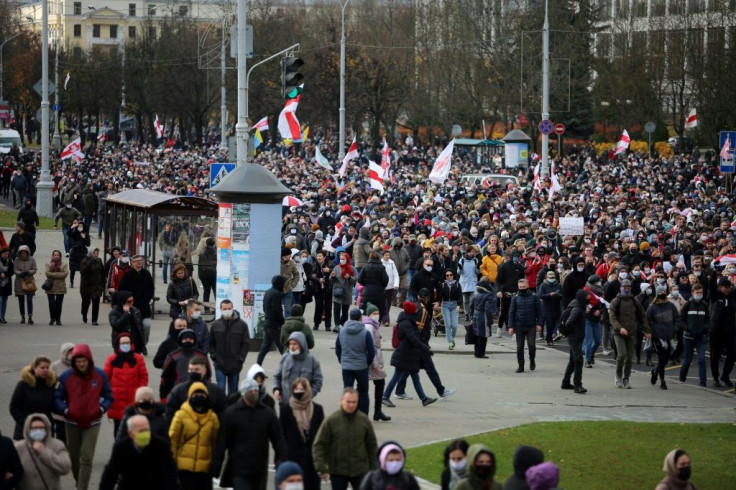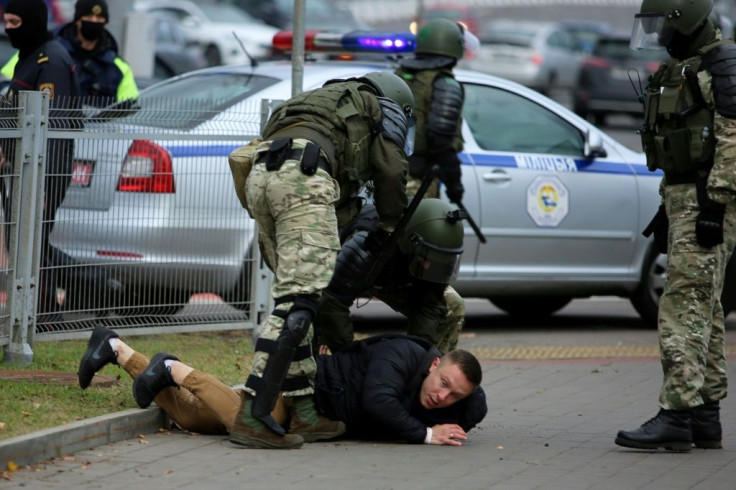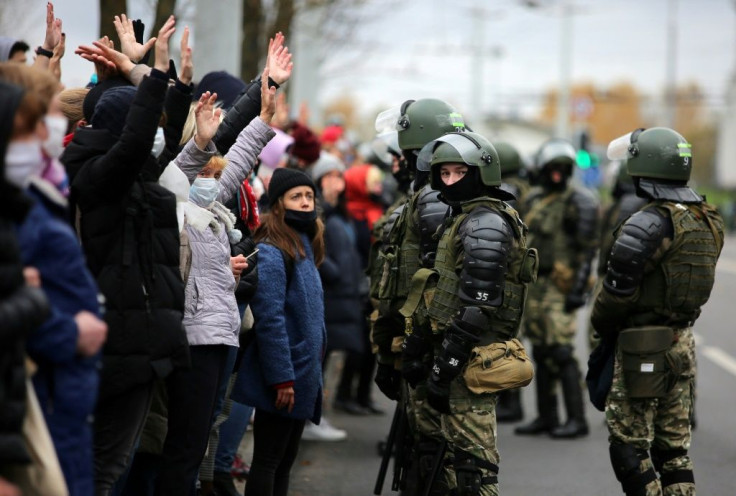Belarus Police Clear Protesters Near Stalin-era Mass Grave
Police in Belarus on Sunday dispersed protesters marching from central Minsk to a Stalin-era execution site in the latest of weeks of demonstrations against strongman Alexander Lukashenko's disputed re-election.
An AFP journalist heard loud bangs and the sound of shots being fired and saw police chasing protesters in a field not far from the Kuropaty site, a wooded area on the outskirts of Minsk where tens of thousands of people were executed during Stalin's purges.
The march aimed to both commemorate victims of Stalin-era repressions and to keep up pressure on Lukashenko who is facing unprecedented protests after claiming victory in an August election.
The last time a march to the execution site was dispersed was under the Soviets in 1988, when authorities used tear gas against an anti-Communist demonstration.

Rights group Viasna said more than 120 people had been detained on Sunday.
Despite the violence, many managed to make it to the memorial site where they unfurled the white-and-red flags of the opposition.
Tens of thousands of people joined the march despite increasing pressure from Lukashenko, who this week threatened to "take no prisoners" if protesters confronted police.
Videos circulated on social media showed that in a break from previous protests authorities deployed armoured all-terrain vehicles with roof-mounted machine guns in Minsk.

Opposition supporters are calling on Lukashenko to step down and hand power to main opposition candidate Svetlana Tikhanovskaya who has taken refuge in neighbouring Lithuania.
After nearly three months of protests and with Lukashenko still in power, some demonstrators said they were exhausted.
"We are afraid to come out, everyone is afraid," said Viktoria Pavlovich, 38.
Yakov, a 51-year-old engineer who did not give his last name, said Belarusians were "very tired".
"We come up with a peaceful protest -- they beat us up; we strike -- they fire us and our children get expelled from universities," he said.

Yakov said many felt "abandoned" by both the West and Tikhanovskaya and wanted more "decisive actions" from the opposition leader.
Tikhanovskaya denounced the vote as a fraud and has been backed by Western leaders who refuse to recognise the result.
"We did not forget our past and we will not forget what is happening now," Tikhanovskaya said in an address to protesters on Sunday.
But the situation appears at an impasse, with the Moscow-backed Lukashenko refusing to go and the opposition unable to force his ouster.
Tikhanovskaya urged her supporters to launch a national strike last Monday but its effect appears to have been limited and officials say the economy is operating normally.
Lukashenko this week appointed a new interior minister and police chief for Minsk and said he would quit only "in your dreams".
Belarus this week closed land borders with EU members Poland, Lithuania and Latvia as well as Ukraine, citing the coronavirus pandemic.
From Sunday, authorities also banned foreigners from entering the country via land border crossings.
After an initial police crackdown on protests that resulted in thousands of detentions and claims of torture in prisons, the authorities this month also threatened to use live ammunition to disperse protesters.
Several people have died in the post-election crackdown.
Western countries have slapped sanctions for vote-rigging and police violence on allies of Lukashenko, who has leaned heavily on support from Moscow.
© Copyright AFP {{Year}}. All rights reserved.





















